Regarding Trump’s Declaration
Some thoughts on the current mess.
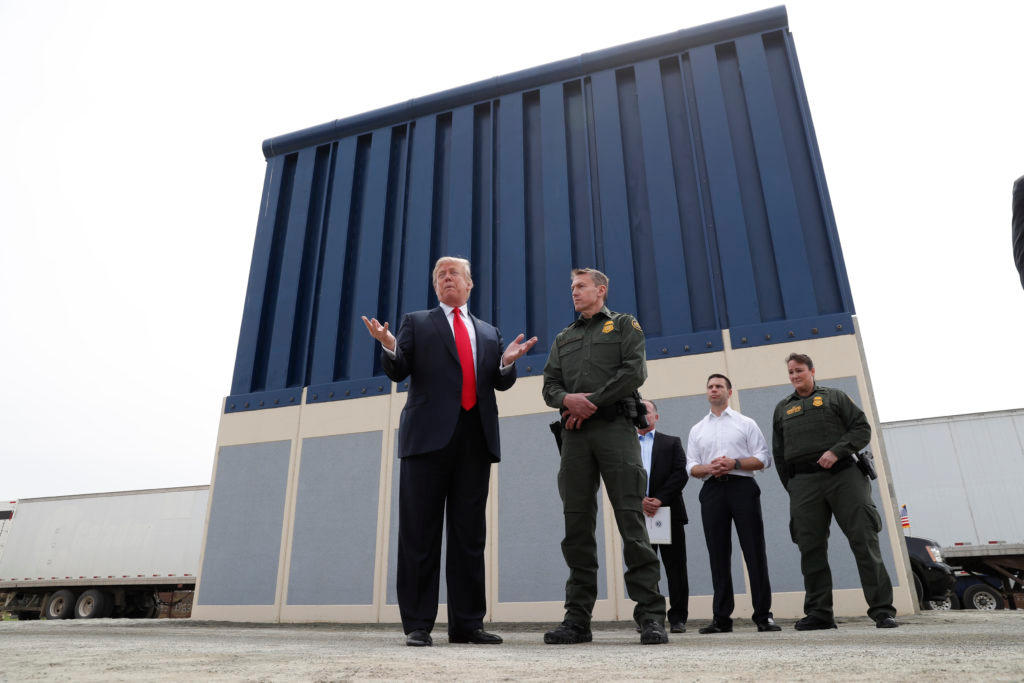 A ton has already been written on Trump’s declaration of an emergency to fund more border wall and there will be plenty more to be said. Here are my initial reactions:
A ton has already been written on Trump’s declaration of an emergency to fund more border wall and there will be plenty more to be said. Here are my initial reactions:
1. It is manifestly not an emergency. This really can’t be said enough: no matter how else you might want to characterize the current situation at the border, it is not an emergency–especially not in terms of the thing that Trump constantly cites in terms of violent crime, gangs, and drug trafficking.
The closest thing to a crisis we have at the moment is about asylum-seekers and a) a wall won’t fix that, and b) the crisis conditions have been caused in large measure by Trump’s own policies.
I would also note: if there was a true emergency on the border that required immediate action, a time-consuming construction project would not be the solution anyway.
2. The move circumvents congressional will. The legislative branch of the United States does not want to fund this policy initiative–full stop. The US Constitution firmly places the power to appropriate money for spending in the Congress. Congress clearly, dating back to December (and really, back the entire last two-year cycle), was unwilling to provide the requested funds. The government was shut down as a consequence, and the legislation to open the government plainly did not include what the president requested. For Trump to then try and use emergency powers in such a circumstance is an authoritarian move.
In simple terms: the Congress clearly said “no” and the appropriate thing for a President to do is accept defeat, not to declare an emergency.
Also along these lines: President “Art of the Deal” clearly does not understand deal-making in the least. If wall funding were truly as important as he makes it out to be, he would have offered incentives to get the Democrats on board. Instead, he basically made demands.
3. McConnell again undercuts norms. When the history of this moment is written, and the issue of how our democracy was eroded, Mitch McConnell is going to play a major role in that analysis. From his declaration that he wanted Obama to fail, to his norm-breaking on the Garland nomination, to his pronouncement this week on the floor of the Senate that he will support the president in this matter, McConnell continues to demonstrate a lack of concern for the long-term consequences of his actions. While I do understand the McConnell found himself between supporting the emergency declaration and facing another shutdown, it does not alter the fact that he is helping undermine his own branch of government. It is short-term political gain for long-term institutional erosion.
4. Trump’s willingness to be a lying con-man is truly disturbing. Trump has, just this week, made the case (in El Paso) that he is already building the wall–and making it sound like he is almost finished. His story keeps changing, and his base keeps falling for it. It is a disturbing display, to say the least.

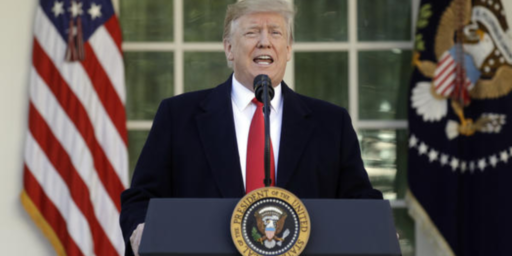

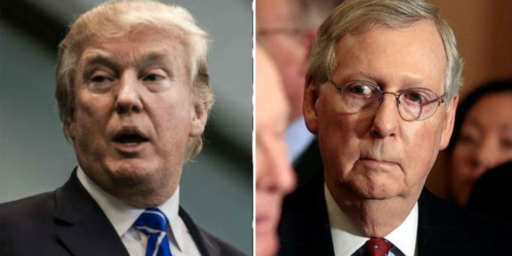
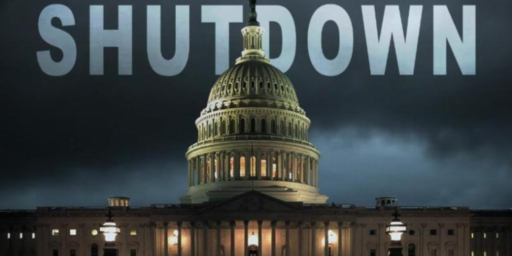
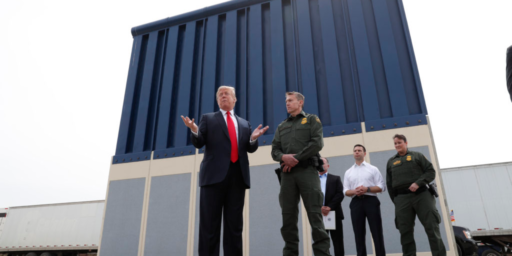
On #2, I think there’s a case that there’s some nuance here. Unless I missed something, Congress said no to putting it in the budget, but they haven’t repealed their delegation of power back to the executive branch to declare emergencies. I wish they’d stop delegating power back to the executive branch for this and many other things, but it seems to be their favorite way to have their cake and eat it, too.
If Congressional will was really to stop the wall building, I think at this point, they could easily make a law that no funds could be spent on the wall, or amend the right to declare an emergency. But they won’t do that, because they aren’t unified, and where they are, their goal isn’t to stop him from building a wall – it’s to be able to say to their constituencies that it wasn’t their fault. From their point of view, it actually helps Democrats for Trump to go forward despite their best (tepid) efforts, because they can make the case in the next election that he needs to be defeated so they can put someone who listens to the will of the people in charge.
No disagreement on your other points, though. I liked “Wait Wait Don’t Tell Me”‘s theory today, that maybe his staff are telling him that the wall is in fact already being built, and hoping he won’t notice all the Chinese people standing on it in the pictures they show him of his fabulous wall.
@gawaine: I think it is pretty clear that Congress refused to provide the specific funding he is now seeking through other means.
Thanks for the comment.
“Trump’s willingness to be a lying conman is truly disturbing.…His story keeps changing, and his base keeps falling for it.”
And this will always be the case for his base. The Trumpkins are the former Palinistas, only they’ve gulped some steroids since 2008. Palin bailed on them, so they had to find a new champion. They found it in what they call “the blue collar billionaire.” (If they only knew how much he despises them as only an arriviste can.) As they did with Palin, they’ve merged their identities with his. An attack on him is an attack on them.
@gawaine:
My understanding is that either house of congress can vote on it, and that this forces the other house to vote. I don’t know what happens if the houses are split, or if the president can veto their negative, but it’s definitely more of a check than most of the delegation of authority.
There are times when events move faster than congress, so some delegation to the executive is appropriate. My only concern with that is what checks are put on it to curb abuses like this.
Ideally, either house rejecting it would end the emergency — president can step ahead of congress if needed, but full approval (or acquiescence) is still required.
McConnell again undercuts norms. …. It is short-term political gain for long-term institutional erosion.
I no longer believe this. McConnell seems intent on destroying bipartisan government at the federal (and maybe state?) level. He’s out to demolish what the Founding Fathers had in mind, not just win another election or two. He damn well knows it and so should you political science types. McConnell will merit pages or even chapters in history texts in a few millennia, and I don’t think he’ll be described for students as “just another politician” any more than Hitler and Mussolini will be remembered as “typical European statesmen.”
Personally I would like to see a little more context around the discussion. I read today that these emergency declarations have been made 59 times since the law was passed in the 70s. Is this one really so consequential, and if so why?
honestly, anything that keeps this idiot bogged down in pointless activity is fine with me. Trump is the death rattle of the 40-year Republican Revolution project, and things are going to head in a much more liberal direction over the next few decades.
@mike shupp: McConnell is a conniving asshole with shitty values, but he’s not Sauron FFS.
@Teve: It is true that “emergency” actions are more common than the word would suggest.
This one is noteworthy because it is, as I note, in direct response to Congress not giving him what he wants.
@Teve: He’s not Sauron?
Sure about that? He’s not Gandalf, for sure. He’s not Bilbo, not Samwise, not Merry nor Pippen, not Boromir, not any of the dwarves. Also, in a less fictional world, looking at some past Congressional leaders, he’s not much like Arthur Vandenberg, Everett Dirksen, Bod Dole, Jerry Ford, or even John Boehner.
How about Saruman the White — a character with a high reputation at the beginning of the story, but whom events reveal as treacherous and deeply corrupt?
@Teve: This may help a little with context.
@Steven L. Taylor: indeed it does. Thanks.
“McConnell again undercuts norms. …. It is short-term political gain for long-term institutional erosion.”
There are no norms, there’s only winning and losing. Or as Doug put it in a thread comment on another post–“politics ain’t tiddlywinks.” The end justifies the means.
We will surely run out of both rope and lamp posts.
@Just nutha ignint cracker: Norms are powerful and important and mostly only noticed when they are violated or done away with entirely.
And I say knowing that politics ain’t beanbag.